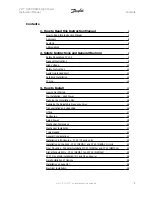
PAGE 4
SAFETY INSTRUCTIONS
RISK OF LOSS OF HEARING
WHAT COULD HAPPEN
HOW TO PREVENT IT
Long term exposure to noise produced
from the operation of air tools can lead to
permanent hearing loss.
Always wear hearing protection.
INHALATION HAZARD
WHAT COULD HAPPEN
HOW TO PREVENT IT
Abrasive tools such as grinders, sanders and
cut-off tools generate dust and abrasive
materials which can be harmful to the lungs
and respiratory system.
Always wear a properly fitting facemask or
respirator when using such tools.
Some materials such as adhesives and tar
contain chemicals whose vapours could
cause serious injury with exposure.
Always work in a clean, dry, well-ventilated
area.
RISK OF ELECTRIC SHOCK
WHAT COULD HAPPEN
HOW TO PREVENT IT
Using air tools to attach electrical wiring can
result in electrocution or death.
Never use nail/staplers to attach electrical
wiring while energized
This tool is not provided with an insulated
gripping surface. Contact with a “live” wire
will also make exposed metal parts of the
tool “live” and can result in electrocution.
Avoid body contact with grounded surfaces
such as pipes, radiators and refrigerators.
There is an increased risk of electric shock if
your body is grounded.
Fasteners coming in contact with hidden
electrical wiring could cause electrocution
or death.
Thoroughly investigate the work piece for
possible hidden wiring before performing
work.
WARNING
WARNING
RISK OF CUT OR BURNS
WHAT COULD HAPPEN
HOW TO PREVENT IT
Tools that cut, shear, drill, staple, punch &
chisel are capable of causing serious injury.
Keep the working part of the tool away
from hands and body.
DANGER
DANGER
WWW.SGS-ENGINEERING.COM































